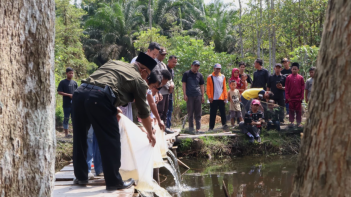Singapore, June 15, 2012 – Darrel Webber, Secretary General of RSPO (Roundtable on Sustainable Palm Oil), an international multi-stakeholder organization for sustainable palm oil, urged everyone to play a role towards a sustainable future. Webber said this at TEDxWWF in Singapore yesterday – a platform that strives to bring together forward-thinking speakers who share their endeavours and insights (scientific, adventurous, artistic or otherwise) that question and change the way people think, live and work to meet the challenges of living on one planet.
Citing a report released by the International Energy Agency in 2011, which stated that the world is heading for irreversible climate change in 5 years if drastic measures are not taken, Webber commented that: “It was a moment of awakening. Being aware of the choices and actions to take was important but inadequate if we do not act on it this very moment, today. The sense of urgency for radical momentum, contributions and change has never been more crucial. There will be a destructive price to pay for our generation and the generations to come if inertia continues.”
The RSPO’s Principles and Criteria is an international certification scheme for producers all around the world in compliance to sustainable cultivation of oil palm from social and environmental perspectives.
With close to 900 members from over 50 countries around the globe and having achieved 6 million metric tonnes of RSPO Certified Sustainable Palm Oil, close to 12% of global crude palm oil in just 4 years since certification began, Webber emphasized the commitment of the RSPO but reaffirmed that: “The RSPO is an exemplary model demonstrating that while it is not easy, it indeed continues to be possible to harmonize one vision amongst such a large and distinct group of individuals representing various organizations, government and communities, from different parts of the world with such diverse cultures, histories, goals and interests and vulnerabilities. However, the RSPO alone will not be able to solve the issue of climate change, deforestation, poverty, species extinction on its own despite being a substantial part of the solution.”
Webber conveyed that the RSPO continues to be committed towards transforming markets to make sustainable palm oil the norm. Successful inroads have been made within the European region, the clear first mover for sustainable palm oil consumption. Webber stressed that uptake of RSPO Certified Sustainable Palm Oil must continue to be accelerated. “Many giants in industry, food manufactures, traders and processors and retailers have pledged that by 2015, all products with palm oil content will be certified sustainable. Nations such as Belgium and the Netherlands have come forward and made pledges to source only certified sustainable palm oil by 2015. There is increasing interest from other parts of Europe towards tangible commitments; India and China have demonstrated interest and concern during recent engagements; the United States of America and Australia continue to be interested and involved as well.” he said.
“What role can each of us play to help move us towards the sustainable consumption and production of palm oil? The industry has come together through the RSPO to play its part, with still much ahead to be achieved. As a consumer, one should ask if the products sold on the shelves be it toothpaste, bread, cookie, bar of soap or pack of noodles have used sustainably sourced palm oil. Immense and unimaginable breakthroughs can occur if we all play our parts, small or mammoth as they may be, and continue to be audacious and act.” Webber concluded.
About RSPO
In response to the urgent and pressing global call for sustainably produced palm oil, the Roundtable on Sustainable Palm Oil (RSPO) was formed in 2004 with the objective of promoting the growth and use of sustainable oil palm products through credible global standards and engagement of stakeholders. The seat of the association is in Zurich, Switzerland, while the secretariat is currently based in Kuala Lumpur with a satellite office in Jakarta.
RSPO is a not-for-profit association that unites stakeholders from seven sectors of the palm oil industry – oil palm producers, palm oil processors or traders, consumer goods manufacturers, retailers, banks and investors, environmental or nature conservation NGOs and social or developmental NGOs – to develop and implement global standards for sustainable palm oil.
Such multi-stakeholder representation is mirrored in the governance structure of RSPO such that seats in the Executive Board and project level Working Groups are fairly allocated to each sector. In this way, RSPO lives out the philosophy of the "roundtable" by giving equal rights to each stakeholder group to bring group-specific agendas to the roundtable, facilitating traditionally adversarial stakeholders and business competitors to work together towards a common objective and making decisions by consensus.
-END-
For further information, kindly contact:
Contact for RSPO Secretariat:
Anne Gabriel, Communications Director | T:+603-22012053 | [email protected]
Contact for Europe:
Giovanni Colombo, Hill+Knowlton Strategies | T: +32 (0)2 231 50 19 | [email protected] ; [email protected]
Contact for Indonesia:
Desi Kusumadewi, RSPO Indonesia Director | T: +62 21 5794 0222 | [email protected]
Contact for India:
Arneeta Vasudeva, IPAN Hill & Knowlton | T: +91-124-4967316 | avasudeva@ipanhillandknowlton.com
Contact for China:
Peter Headden, Hill & Knowlton | T: (86 10) 5861 7597 | [email protected]
Keep reading

Rowo Ombo: From Neglected Swamp to a Symbol of Hope and Conservation in Jambi, Indonesia

Save the Date: The 22nd General Assembly (GA22) of RSPO Members

Access into prisma

10 Years of RSPO in China: Driving Palm Oil Transformation Towards Sustainability

Updated Trace Function in prisma

Call for Expression of Interest: Independent Investigation of a Complaint

Latin American Smallholders, Key Global Brands Gather in Peruvian Amazon to Advance Sustainable Palm Oil

RSPO Forum for Members and Certification Bodies 2025: Strengthening Capacities and Building Bridges with RSPO Members




